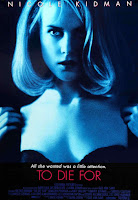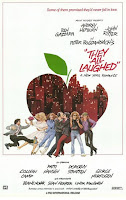Better week this time.
Movies
Collective (Colectiv) (2020)
A mostly pretty engaging documentary about the investigative journalism that exposed all the healthcare fraud that came to light after the Colectiv nightclub fire in Romania. This is one of those situations in which, from a cinematic perspective, the filmmakers lucked into documenting an investigation that became much bigger than anyone could have guessed at the outset, and consequently, this movie has a you-are-there component that's pretty rare in these activist-journalism type of documentaries because that sort of thing is so hard to capture from the beginning as it's happening. It's wild to see all these tropes from Hollywood journalism movies like Spotlight or The Post or whatever show up in real life, too, like two journalists sitting in a room full of evidence summarizing what they knew until they both come to the same conclusion at the same time and then run to their phones to tell their editors. There's also a scene in which someone puts together two pieces of evidence and then exclaims, "They knew!" I could have sworn those tropes were pure screenwriting. But anyway, the other side of this being basically documented in real time is that it eventually starts to have the feel of reading a very long series of investigative articles in a newspaper, and if you've ever done that, you know that the experience involves having to read a lot of the same information over and over again as the slow trickle of new information gets sandwiched in the familiar stuff. After a while, this documentary struggles to avoid becoming a shapeless mass of threads. I guess it's unfair of me to expect, like, Real Life to be engaging and well-organized at all times, but also, isn't that what documentaries are for? Grade: B
Light from Light (2019)
I mostly bounced off of Something, Anything, the first feature film written and directed by Paul Harrill, but Light from Light really hit me. There's still some of the stilted emptiness and indiespeak dialogue that I didn't connect with in Something, Anything (the plot here about the two teens didn't do a lot for me), but far more often, Light from Light finds stillness rather than emptiness, and there's something really rich and beautiful about the way that Harrill allows the visual and sound environments of this film to fill with transcendental space. It's a quietly profound movie about grief and the way that the supernatural joins us in that—a central component of both personal loss and the metaphysical is the sense of mystery, that you will never be able to know enough to have it all make sense, and the dynamic between this movie's two main characters (Marin Ireland's paranormal investigator and Jim Gaffigan's widower who hires her to perhaps find his wife's ghost) embodies that very well. Also, Knoxville peeps will have fun identifying the McGhee-Tyson airport and pretty much no other notable Knoxville locales, which is how you know this is done by a true local. Get that Visit Knoxville whitewashing outta here! (JK, there's also some extremely beautiful Smokey Mountains locales, which are great, too) Grade: B+
UHF (1989)
This movie is definitely at its best when it's just a bunch of random stuff that Weird Al's character puts on his television station; I'm hard-pressed to think of the last thing I saw in a movie that made me laugh as hard as the "Wheel of Fish" segment. On the other hand, when UHF focuses on plot, it mostly stumbles, as a bunch of these kitchen-sink comedies tend to, but I gotta give this one points for having a finale centered around wrestling the TV station from corporate control and turning it over to public ownership, which is inspiring. Oh, also, Michael Richards, aka Cosmo Kramer, is in this? So few projects figure out how to reign in that dude's unbelievably intense screen presence, and I'm not sure if UHF consistently does, but the part where he gives his character's star-making monologue on mops is really something. Grade: B
In the Realm of the Senses (愛のコリーダ) (1976)
File this under "I Don't Get It." I was not expecting a movie that is basically wall-to-wall sex to be boring and academic and over-considered, but that's definitely my reaction to it. I dunno, I guess there's something potentially interesting to me about the idea of an employer and an employee entering into a sexual relationship whose power dynamics create a situation of mutually assured destruction, but in practice, I just got really tired of watching these people have sex, which is part of The Point, I suppose, something about the droning repetition of obsession and the patriarchal assumption that men are free to walk away from sexual encountered unencumbered by the humanity of the person they just slept with. But even with the increasingly inventive, uh, techniques in the movie, I found this more tedious than engaging. Why, you may ask, would I watch a movie notorious for tons and tons of sex if I didn't find that concept inherently interesting? I have no good answer for that. Sometimes you just want to check a canonical movie off the ol' list. I try to be an optimist going into that sort of obligation, but it let me down here. Grade: C
Dark Star (1974)
A movie that is more often boring than not, but whose charms are so charming that the whole experience registers as somewhat positive. It's a shaggy sci-fi comedy about a deteriorating spaceship manned by a bunch of blue-collar dudes who just wanna get stoned and have philosophical debates with a sentient bomb and fight beach-ball space aliens and listen to their made-for-this-movie country song about a space guy pining for Benson, Arizona, and it's all scored by some great early analog-synth sounds from John Carpenter (who also directs, of course). There's just a lot of empty space between these components, which is halfway a parody of the yawning chasms of cinema in 2001: A Space Odyssey but also just kind of an amateur venture to pad out the film—hence my occasional boredom. Much more the debut of screenwriter Dan O'Bannon (Alien) than it is the debut of the John Carpenter we all know and love, but it's fun to see those two fellas work together. Grade: B-
Slaughterhouse-Five (1972)
Slaughterhouse-Five should be one of those unadaptable novels, and I think this basically proves that it is, though it's pretty successful as a movie. The good parts are very good: the film is super clever in how it edits together the shots where Billy "jumps" in time, and the Dresden stuff is pretty much 100% great. But neither the time-jumping nor the postwar cynicism is what makes Vonnegut's novel difficult to adapt. It's the particular tone of the novel, the intersection of Vonnegut's wry narration and the whimsy alongside the cynicism; the movie obviously can't include the narration (thank goodness they didn't try voiceover), so it loses some of the most memorable stuff about the novel that would have been hard to capture on film anyway, like "So it goes," and it almost entirely flubs the whimsy, which too often veers into just thin silliness here (including the Tralfamadorians, unfortunately). And that's not even getting into the female characters—Vonnegut was never great at female characters, but to his credit, this movie is profoundly worse. Nevertheless, though it kind of fails in some of the specifics, this movie still succeeds at the novel's basic project of the sad existentialism born from the juxtaposition of breathtaking beauty and searing horror. Some moments here are so striking in evoking that project that it makes me wish they'd been able to land the whole thing. Grade: B
Television
A Series of Unfortunate Events, Season 1 (2017)
It's been about two years since I went through all of the books in this series, so it was fun revisiting them through this TV show, which is very faithful to the novels. The books' repetitive structure and slow-building (but never dominant) continuity makes them ideal for adapting into a TV series—though I kind of wish they'd done just one episode per book, since spreading each book over two episodes makes the series threaten to overstay its welcome at times (I'm not joking that you could probably read the entirety of The Bad Beginning in the amount of time it takes to watch the two episodes adapting it). I also have mixed feelings about how the show weaves in a lot more conspicuously the ongoing conspiracy/secret society context; on the one hand, it gives reprieve from the sometimes tired formula that the early books fall into, but on the other hand, it does kind of feel like the show is tipping the hand of the usually close-to-the-chest books and spoiling a little of the excitement of the later books' dot-connecting. And while I'm nitpicking, the tone is also a little less dry and a bit more outwardly silly than the books, too, which is mostly fine but also plays up some of the smarminess the books could dip into at times. But other than those things, this show is a lot of fun and makes some truly inspired choices in adapting the source material, the most inspired of them all being the inimitable Patrick Warburton playing Lemony Snicket himself, wandering the sets and occasionally talking to the camera to deliver the trademark word definitions and wry commentary that defined the book's narrative voice. It's great. There's impeccable casting throughout the show, and each one of them is perfectly in-tune with the blackly comic sensibilities of the series—a good thing, because without the performances being synced to the material, this probably wouldn't have worked. But it does, and of course, the basic material of the books, which this mostly doesn't deviate from except for introducing the broader mythology stuff and a few entertaining musical sequences, is strong indeed. I'm looking forward to checking out the other two seasons, as the source material gets even stronger. Grade: B

























